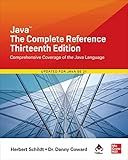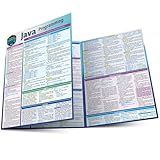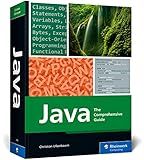Best Java Programming Guides to Buy in February 2026

Java: The Complete Reference, Thirteenth Edition



Java for Beginners: Build Your Dream Tech Career with Engaging Lessons and Projects



Head First Java: A Brain-Friendly Guide



Java All-in-One For Dummies



Java Programming Language: a QuickStudy Laminated Reference Guide



Java: The Comprehensive Guide to Java Programming for Professionals (Rheinwerk Computing)



Java Coding Problems: Become an expert Java programmer by solving over 250 brand-new, modern, real-world problems



Learn Java with Projects: A concise practical guide to learning everything a Java professional really needs to know



Java: A Beginner's Guide, Tenth Edition



Effective Java


In Java, you can declare a variable by specifying the data type followed by the variable name. For example, to declare a variable of type integer, you would write:
int myNumber;
This creates a variable named "myNumber" of type integer. You can also assign a value to the variable at the time of declaration, like this:
int myNumber = 10;
This declares a variable named "myNumber" of type integer and assigns it the value of 10. Remember that variable names should follow certain rules, such as starting with a letter, underscore, or dollar sign, and can contain letters, numbers, underscores and dollar signs.
How to declare a local variable in Java?
To declare a local variable in Java, you need to specify the data type of the variable followed by the variable name. For example:
int age; // declaring an integer variable named age String name; // declaring a string variable named name double salary; // declaring a double variable named salary
You can also initialize the variable at the time of declaration:
int age = 25; // declaring and initializing an integer variable named age with a value of 25 String name = "John"; // declaring and initializing a string variable named name with a value of "John" double salary = 50000.0; // declaring and initializing a double variable named salary with a value of 50000.0
Local variables are declared within a method, constructor, or block and can only be accessed within that scope.
How to declare a variable in Java using camel case naming convention?
To declare a variable in Java using camel case naming convention, you should follow these steps:
- Start with a lowercase letter.
- If the variable name is made up of multiple words, capitalize the first letter of each subsequent word.
- Do not use any spaces or special characters in the variable name.
Example:
int myVariableName; String anotherVariableName; double totalAmount;
What is the syntax for declaring a variable in Java?
To declare a variable in Java, you use the following syntax:
DataType variableName;
For example, to declare an integer variable named "age", you would use:
int age;
You can also assign a value to the variable when declaring it like this:
int age = 25;
How to declare a variable in Java within a loop?
To declare a variable in Java within a loop, you simply need to declare the variable before the loop and then initialize it within the loop. Here is an example:
public class LoopExample { public static void main(String[] args) { for (int i = 0; i < 5; i++) { int num = i * 2; System.out.println(num); } } }
In this example, the num variable is declared inside the for loop and is initialized with a value of i * 2 on each iteration of the loop. The scope of the num variable is limited to the for loop block, meaning it is only accessible within the loop.
What is the difference between declaring a variable in a method and a class in Java?
In Java, declaring a variable in a method means that the variable is only accessible within that particular method and holds its value for the duration of that method’s execution. Once the method is completed, the variable goes out of scope and cannot be accessed by other methods within the class.
On the other hand, declaring a variable in a class means that the variable is accessible to all methods within that class. It is a member of the class and retains its value for as long as the instance of the class exists. This allows the variable to be shared and modified by different methods within the class.
In summary, the main difference is the scope and lifespan of the variable: a variable declared in a method is only accessible within that method and has a limited lifetime, while a variable declared in a class is accessible to all methods within the class and exists as long as the instance of the class exists.
